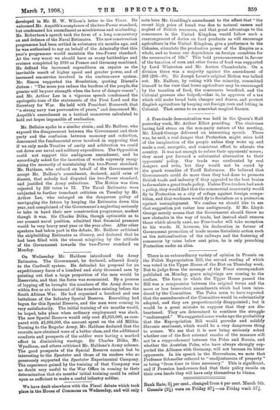We have dealt elsewhere with the Fiscal debate which took
place in the House. of Commons on Wednesday, and will only
note here Mr. Goulding's amendment to the effect that " the recent high price of bread was due to natural causes and neglect of British resources, and that great advantage to the consumers in the United Kingdom would follow such a rearrangement of duties on food products as will encourage agriculture in the United Kingdom, give a preference to the Colonies, stimulate the productive power of the Empire as a whole, and so lessen our dependence on foreign countries for the necessaries of life." This bold pronouncement in favour of the taxation of corn and other forms of food was supported by Lord Winterton and Mr. Austen Chamberlain. On a division there was a majority against the amendment of 203 (293-90). Sir Joseph Leese's original Motion was talked out. Mr. Balfour, by voting with the minority, committed himself to the view that home agriculture may be encouraged by the taxation of food, the consumers benefited, and the Colonial growers also helped,—that is, he approves of a tax which will make bread both cheaper and dearer, and protect English agriculture by keeping out foreign corn and letting in Colonial. That seems to us somewhat magical finance.














































 Previous page
Previous page